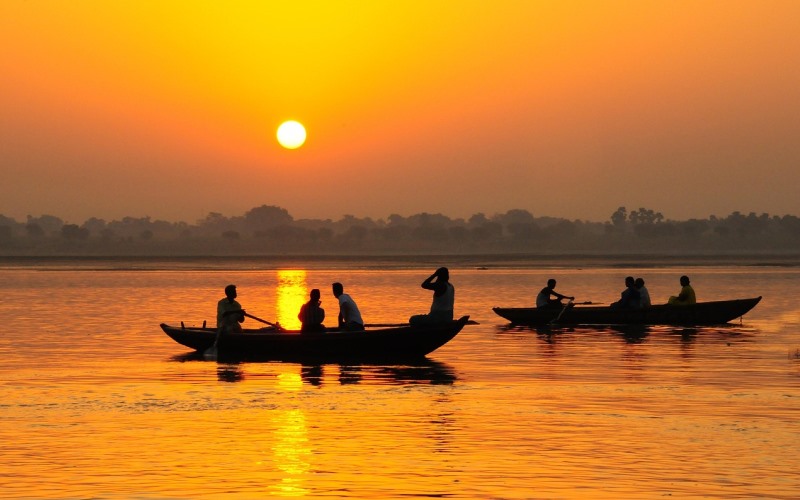
Former Environment Minister Jairam Ramesh bearing the green flag, being shown the way by the Eco Clubs Coordinator in Delhi Government Dr. B.C. Sabata. This image is metaphorical since interest in environment has been at its peak from the time Shri Jairam Ramesh wass appointed the Environment Minister. Simultaneously, the tremendously successful decades long Eco Clubs programmes of the Government of Delhi is responsible for environmentally aware and sensitive youth of today.
Our planet today is facing several environmental problems due to an ever increasing population and rapid pace of development. This calls for developing a responsible behavior towards Nature and Natural Resources and it is now essential to adopt a harmonious and solution-oriented approach towards the environmental issues that confront us.
A comprehensive understanding of the environment, its economic, social and political aspects, is the need of the hour. Imparting Environment Education is the first step towards developing an environmentally conscious and responsible behaviour in the citizens which make the society. It is not surprising then that the United Nations has proclaimed the decade from 2005-2014 as the UN Decade of Education for Sustainable Development.
The National Policy on Education (1986) of India states that protection of environment is a value which, along with certain other values, must form an integral part of curriculum at all stages of education. Consequently, Environment Education has been mainstreamed at school, college and university levels.
Students pursuing a Master’s course in the subject are at the threshold of becoming tomorrow’s leaders and decision makers who are going to play a very crucial role in tackling environmental issues. Environmental Studies at the Master’s level is taken as an interdisciplinary academic field, where one studies human interactions with the environment and what impacts either has on the other.
If your interest in the natural world is diverse, then studying Environment at Master’s level is a good option for you. This is because you can then study a wide range of subjects with respect to environment.
Delhi, one of the greenest cities in India, is equipped with several universities which allow the students to develop skills in Environment, its Management and in Sustainable Development. Following is a preliminary analysis of some of the Courses on Environment being offered by the different universities in Delhi.
Department of Environmental Studies (DES), University of Delhi
The Department of Environmental Studies (formerly the School of Environmental Studies) was established by the University of Delhi in 2001 to promote interdisciplinary approaches to the study of our common environment. DES offers a unique M.A./M.Sc programme in Environmental Studies.
It is the first and the only Department in Delhi to offer a combined postgraduate degree in the humanities (M.A.) as well as the science streams (M.Sc). The interdisciplinary approach adopted by DES in teaching Environmental “Studies” makes it distinct from the other universities imparting Environmental Education.
However, the students feel that the curriculum of the course lacks quality field work. D.P. Srivastava, a student of M.A. Environmental Studies feels that the department has immense potential and has already produced articulate and impactful environmentalists. “With better management and leadership to take initiatives, the DES has immense potential in producing world-class environmentalists.”, he added.
School of Environment Sciences (SES), JNU
SES, JNU was established in 1974, making it the oldest and the most experienced institution imparting Environmental Education in Delhi. It offers students an M.Sc in Environmental Science. The University has a persistent record of experienced Faculty and successful alumni.
Being in JNU has its own charm and the influence of the multicultural campus, with students from myriad academic fields, helps in shaping the personality of all students. This in turn is an add-on for students pursuing M.Sc in Environmental Science at JNU. A wide array of topics are covered in detail at SES, JNU which is a requirement for such a Course.
However, since the nature of the Environmental Studies subject is interdisciplinary, the scope of the curriculum needs to be extended beyond science. According to Disha Sharma, an alumni of the course and currently pursuing her Ph.D., “the course structure is very theoretical and needs to connect to environmental policies as well as with contemporary environmental problems facing the society”.
University School of Environment Management (USEM), Guru Gobind Singh Indraprastha University (GGSIPU)
The GGSIPU is one of the first Universities in the country to start a Master’s programme in Environment Management. The M.Sc in Environment Management programme provides an interdisciplinary study of environmental issues and their management.
Students are taught environmental issues from diverse approaches like science, social science, economics, engineering and management. The curriculum lays emphasis on the use of resources and their efficient management.
According to Aastha Kukreti, an alumni, who is currently working in the NGO sector, “The Course has enabled me with skills to work as an Environmental Consultant, carry out environmental research for the Delhi Government and lead the environmental NGO sector with same potential.”
The course has provided useful service to the nation by preparing many environmental managers with a holistic focus. Another alumni Manish Kumar credits the Course for laying the foundation of his career. “I started my career in GIS & Remote Sensing, then entered in core environmental management and then planning work, it all started after completing the Masters in Environment Management from GGSIP University.”
TERI University
TERI University is the first of its kind to dedicate itself completely towards environment and sustainability. It offers several courses like M.Sc in Environment Studies and Resource Management, M.Sc in Climate Science and Policy, M.Sc in Geo-Informatics, M.Tech Renewable Energy Engineering and Management and M.A. in Sustainable Development Practice.
The University is renowned because of its green infrastructure and ‘beyond the classroom’ studies as it organises several seminars and conferences for the students to participate. However, TERI University has diversified the subject of Environmental Studies into various courses at the Master’s level itself.
This deprives the students in adopting a holistic approach towards the subject. Consequently, with respect to the course curriculum, several drawbacks seem evident. Raghav Saraswat, an alumni of M.Sc in Environmental Studies and Resource Management Course points out, “The programme has little practical exposure, I expected a bit more of science, and hoped a few more optional subjects could’ve been included/ taught”.
Another alumnus Pallavi Pant, who pursued M.Sc. in Environmental Studies and Resource Management found the curriculum of the course interesting. “The curriculum was at par with similar courses at other universities but I did feel that there wasn’t much technical focus. However, I got an excellent overview which helped me in deciding my area of interest that I wanted to pursue further”.
Jincy Joy, who completed her M.Sc in Climate Science and Policy at TERI University feels that the Course has helped her gain knowledge of various dimensions of climate change.
Indian Institute of Technology, Delhi (IIT-D)
Recognising the emerging challenges for environmental friendly and sustainable economic development, the IIT-D offers a unique broad based programme in Environmental Engineering and Management. The M.Tech in Environmental Engineering and Management, as the programme is called, is an interdisciplinary programme of four semesters administered by the Department of Civil Engineering.
The best of faculty and brilliant students account for the success of the programme. The course has played a very crucial role in meeting the growing demand of human resource professionals in the fields of environmental policy and planning, environment impact assessment, sustainable industrial development and environmental management of infrastructure.
Jamia Millia Islamia, New Delhi
The Faculty of Engineering and Technology offers a Postgraduate course leading to M. Tech. in Environmental Science and Engineering under the Department of Civil Engineering. It is a three years course consisting of six semesters. The course is mainly targeted at producing engineers and scientists in the field of Environmental Studies.
Delhi Technological University (DTU)
Formerly called the Delhi College of Engineering, the DTU offers an M.Tech Course in Environmental Engineering though the Department of Civil Engineering. Students are taught the basic technologies behind improving the environment: air, water, land resources and so on.
The Course believes that environmental engineering can help combat water and air pollution, recycling and waste management and solve public health problems. The Course has immense job opportunities and students find themselves well placed after the completion of the Course.
Indian Institute of Ecology and Environment (IIES), New Delhi
The IIES was established on the occasion of the World Environment Day on 5 June 1981. The institute offers many distance learning courses at postgraduate level including an M.Sc in Environmental Sciences. This two year distance learning programme is conducted in collaboration with The Global Open University, Nagaland.
The course had been designed particularly to meet the growing demand of experts in the field of environmental management, environmental impact assessment and natural resources conservation. Other courses that the institute offers at Master’s level are M.Sc in Sustainable Development, M.Sc in Remote Sensing and MBA in Environmental Management.
Ambedkar University Delhi (AUD)
This is perhaps the most recent entry into the universities offering Postgraduate programmes in environment. AUD itself was established by the Government of the NCT of Delhi through an Act of the State Legislature as recently as 2007.
The University offers an M.A. in Environment and Development with an aim to foster interdisciplinary research and learning in the areas at the intersection of human society, non-human beings and the biophysical environment. The relevance of the Course cannot be denied. However, its acceptability and success will only be determined by time.
Concluding Remarks
With increasing awareness about the need to protect and conserve the environment, environment education is increasingly gaining importance. However, even after the existence of a large number of interdisciplinary Courses at the Master’s level, much more is needed to be done to make the subject applied.
Nevertheless, the status of environmental education looks bright and holds a promising future for its students. Success in this field depends largely on one’s interests and love towards nature and its awe inspiring processes. Those with an interest in equity and an intense desire to protect and conserve resources for posterity would especially find this subject very appealing.
The present article is part of a three part series on surveying the Environment Education landscape at school, undergraduate and postgraduate level in the NCT of Delhi.




Thank you for this valuable information.
About TERI University’s Env. Studies course, I forgot to mention about the 6 month dissertation which provided valuable field-experience.